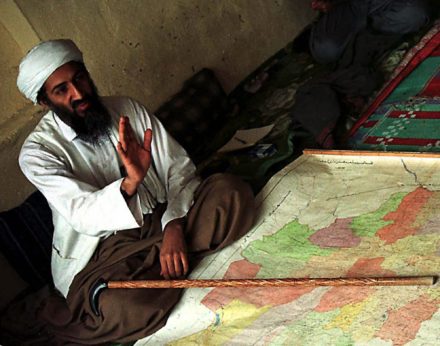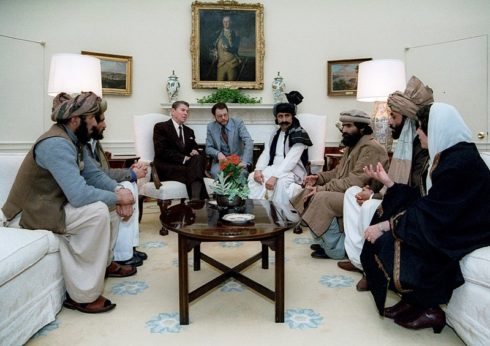
Refugees fleeing Assad’s terror in Syria or from warlords and terrorist networks in Yemen, Somalia, and Libya are refused entry to the U.S under the Trump administration’s travel ban, which the Supreme Court upheld by a 5-4 vote on June 26.
For a restriction supposedly aimed at keeping terrorists and other security threats out of the U.S., though, there was one glaring absence among the list of banned nations.
Why isn’t Saudi Arabia—the home of Al Qaeda—included?
The decision to exclude that country should be seen in the larger perspective of U.S. history, given that Saudi Arabia is one of the most theocratic Muslim countries in the world. In fact, the exclusion of Saudi Arabia makes a perfect equation in the algebra of American ambitions in the region.
Client state
The U.S. backed the alliance between Wahhabist Islam and the Saud family in 1932 with the urging of Standard Oil which actively lobbied for closer ties with the Kingdom. Wahhabism, a relatively small sect within global Islam, teaches that their particular definition of the faith makes them Salafis, or “the Chosen,” while all other Muslims, Christians, and Jews are irredeemable. Centered in Saudi Arabia, where its teachings are part of the curricula of state-run schools, Wahhabism served as the inspiration of both Al Qaeda and ISIS.

The Cold War brought Saudi Arabia closer into the U.S. orbit. After the defeat of the United States in Vietnam in 1975, American focus shifted to the Middle East. America’s foreign policy architects feared anti-colonial uprisings and socialist politics. This obsession was presented to the American people as a fear that the Red Army would roll into and secure the oil-rich regions. This new focus of the U.S. “containment” policy amounted to fear of a grassroots Arab, Turkish, Pashtun, Persian, or Kurdish socialism.
The U.S. has maintained three major military bases in Saudi Arabia. After Iran ceased to act as a U.S. satellite in the region, the Reagan administration supplied Iran’s enemy, Saddam Hussein’s Iraq, with military support. The subsequent devastating war between the two countries killed as many as one million people. Donald Rumsfeld, later George W. Bush’s Secretary of Defense during the invasion of Iraq, made two friendly visits to Saddam Hussein during the early 1980s.
However, Saudi Arabia remained, along with Israel, the U.S.’s most reliable ally in the region. The country has continued to be an American client state that served American economic interest, as evidenced by Trump’s early visit and warm welcome in the Kingdom.
The Afghanistan connection
Afghanistan secured freedom from British imperial rule in 1919 after three “Anglo-Afghan Wars.” It seesawed between its native socialist parties and varieties of religious movements. In fact, it became the first nation in the world to sign a “Treaty of Friendship” with the Soviet Union in 1923.
More than fifty years later, in 1978, Afghanistan’s socialist government came under attack from a variety of conservative Islamic groups, many of them based outside of the country. Opposition to the education of women in the state school system motivated much of the reactionary effort to destroy Afghanistan as a viable state.

The Soviet Union, in what would become a disastrous decision, entered the country in 1979 to support the friendly government. Extremists from around the region, but particularly from Saudi Arabia, went to Afghanistan to fight as Mujahedeen or “holy fighters.” In fact, this is what delighted America’s Cold War hawks about Afghanistan.
Among the imported extremists was Osama Bin Laden, a young Saudi from a prominent family in the Kingdom. These fighters, including Bin Laden, received training and weapons from the U.S. Central Intelligence Agency.
Intellectual dishonesty and moral hypocrisy
The reasoning of the conservative justices who legitimized the executive branch’s authority to declare a ban based on “national security” is absurd. Wouldn’t accepting Muslims fleeing terrorists (they are, after all, the most frequent victims of terror) actually combat terrorism? Intellectual dishonesty and moral hypocrisy are frequent bedfellows. The justices are displaying both.
It’s notable that the travel ban includes three African nations. Trump made his feelings about African people clear when he used the vulgarity “shitholes” to describe that diverse, complex, and beautiful continent. Obviously, there’s a relationship here between the inveterate racism he has always displayed toward Black people and his desire to deny people of African descent entry to his white America.
Maybe Trump’s business interests in Saudi Arabia (as well as those in Egypt which is also excluded from the ban) play some role. The Trump organization has limited liability corporations set up in both countries in order to promote the Trump brand. Using high office to receive emoluments comes as a matter of course to the Trump family and its allied mafioso.
I, of course, do not mean to suggest that Saudi Arabian citizens should be restricted from travel in the United States. They already face a panoply of laws in Saudi Arabia which they violate at their peril. Saudi citizens have real justification for seeking asylum in the United States.
We must welcome refugees, not only as fellow citizens but also as our neighbors and our friends. If there is to be a human future, it cannot be one in which we build walls, close borders, and impose bans. The dream of an international struggle of workers united must survive.










